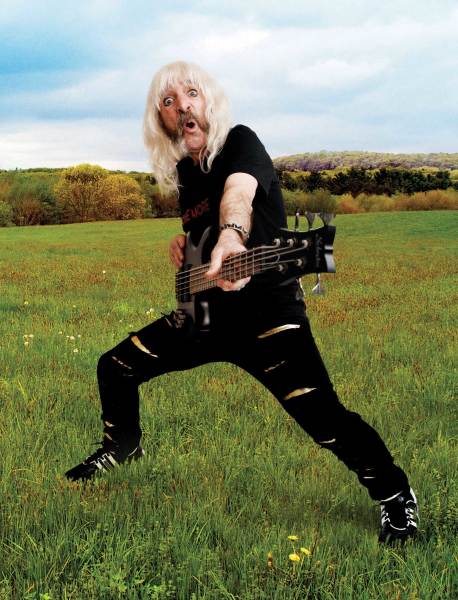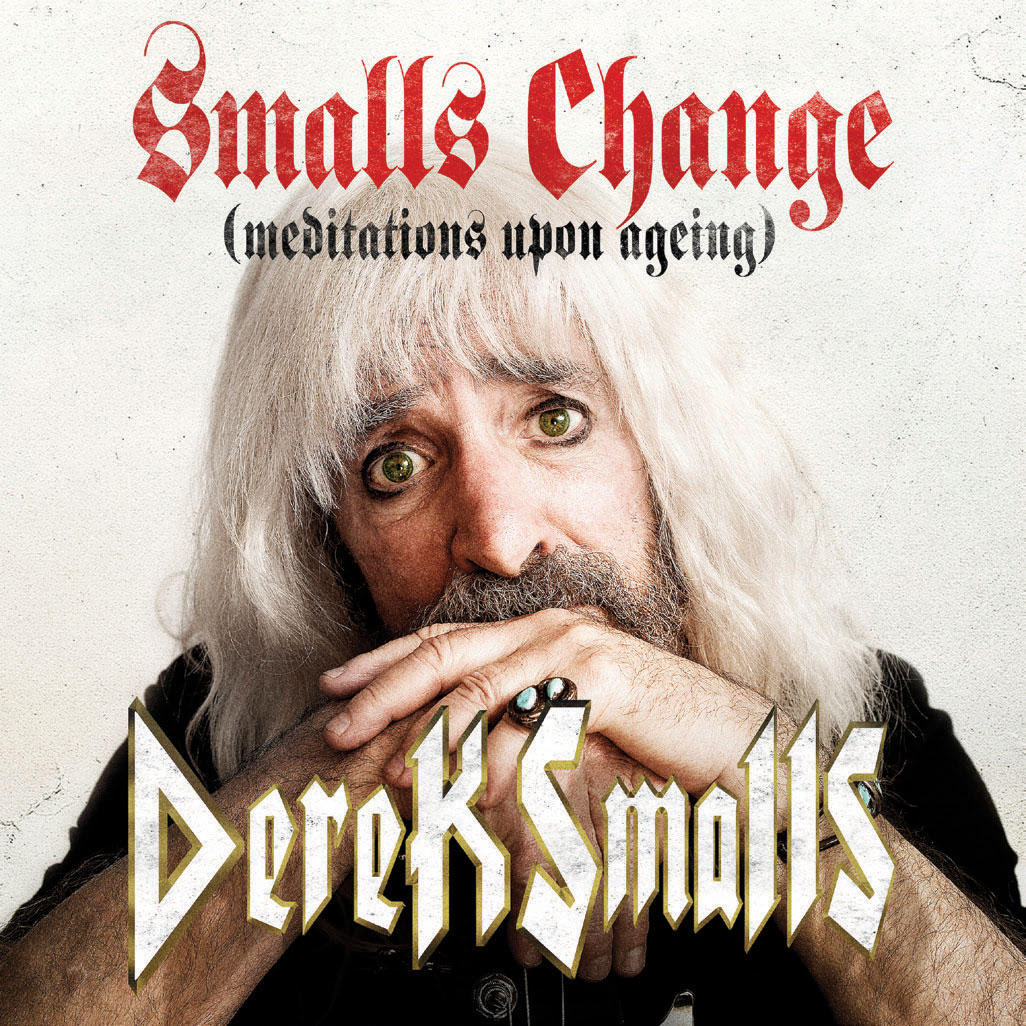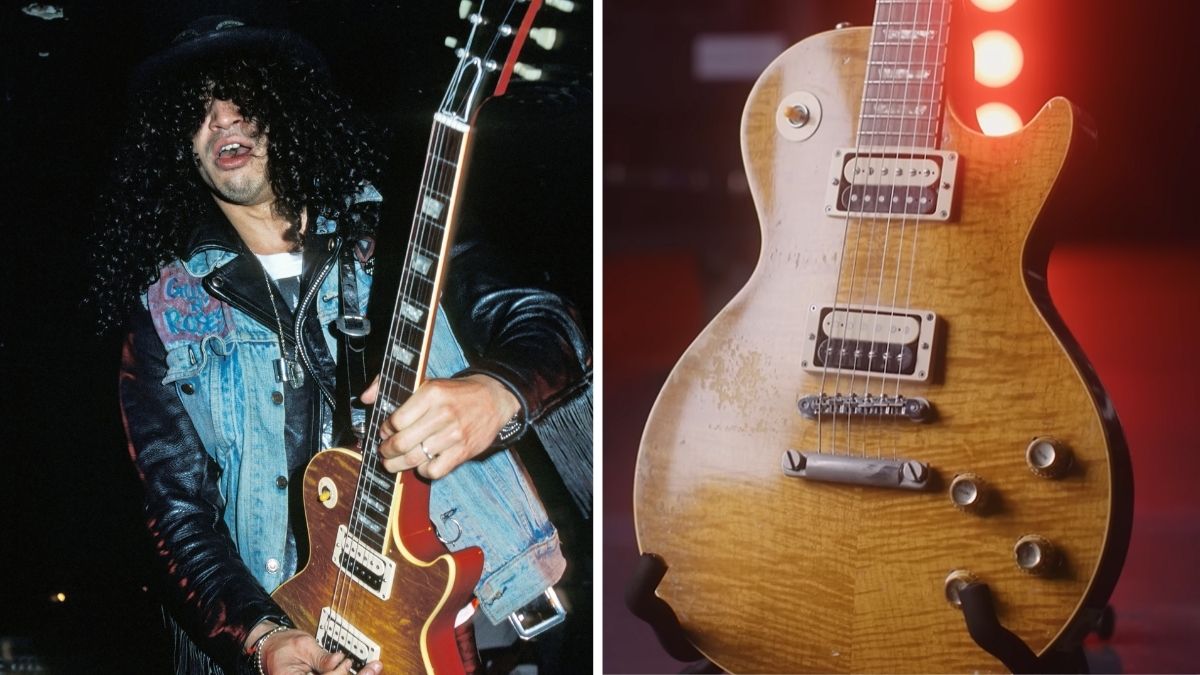Spinal Tap's Derek Smalls Talks "Saucy Jack," Trouser Zucchini and His New Satch- and Vai-Infused Solo Album
All the latest guitar news, interviews, lessons, reviews, deals and more, direct to your inbox!
You are now subscribed
Your newsletter sign-up was successful

He supplied Spinal Tap's big bottom end for decades—now he's released a solo album with some help from Steve Vai, Joe Satriani, Steve Lukather and Dweezil Zappa. But what Guitar World readers really want to know is...
Your new album, Smalls Change: Meditations Upon Ageing, is your first solo release in almost four decades. why’d you decide to re-emerge as a solo artist after all these years? —Elliot Chevron
Yes, it’s my first full solo album. It’s a Smalls World from the late Seventies was a “super EP” that was mastered on 8-track, so it’s lost to the world. As far as why now, it was a choice of coming back or going away. Spinal Tap was not going to come back, it seemed, and I was sitting, I was in Albania—I wasn’t sitting, I was walking around Albania, but sometimes I was sitting—at the home of a friend, Eddie Dregs, who is in Chainsaw Vermin, a near-death metal band that’s very big in Eastern Europe. It’s very slow, dirge-y music; it seems like it’s never going to end—and then it does.
I was sitting in from time to time because their bass player is prone to every vice known to man—and woman—and I just asked myself, “Is this where it ends, Derek? To be the sit-in bass player for Chainsaw Vermin?” Around that time, I saw an advert for something called the British Fund for Ageing Rockers, and you could apply for a grant, which I did, and it made all this possible. It was a combination of desperation and opportunity. The desperation comes first, though. That’s key.
Your new album features guest appearances by Steve Vai, Joe Satriani, Dweezil Zappa, Steve Lukather, Richard Thompson and more. However, one six-string legend is noticeably missing, Spinal Tap’s Nigel Tufnel. Why isn’t he on the album? —Damien Linotte
I opened the door to him. I did say, “Mate, if you want, there’s a seat for you at the table at the banquet.” And he acknowledged the receipt of the invitation, he saw that the door was open and, as a free man, chose not to walk through it. There was no rancor or anchor or anything like that. It was just, “Thanks, mate.” He’s busy breeding miniature livestock, and I guess, almost literally, he had his hands full. He had little miniature goats to round up. They’re very cute. But, last I heard, he was having a problem with them because they’re too small to milk.
Spinal Tap appeared on The Simpsons a while ago. When you recorded your voices for that episode, did you get a chance to interact with the regular voice-over actors on the show, including Hank Azaria, Dan Castellaneta or Harry Shearer? —Whit Summers
All the latest guitar news, interviews, lessons, reviews, deals and more, direct to your inbox!
Well, it was an animated version of Spinal Tap, of course. We’re not really yellow. And no, we came in and did our parts by ourselves, which is what they do for the celebrities. They say, “You can come in when you want to, and we’ll bring the cattle in at the regular time.”
In the 1984 film This Is Spinal Tap, there’s an embarrassing scene where you remove an aluminum-foil-wrapped vegetable from your pants while going through a metal detector at an airport. A lot of people think that was a cucumber, but it was actually a zucchini. How do you decide which vegetables (or fruits) to shove down your trousers? —Emmet Sumner
Well, I don’t anymore. That was our first big U.S. tour. I never had any problem in that department, with the power stance, as you might call it. But I just thought, Be on the safe side, Derek. Stage fright, nerves, big houses, big rooms and big crowds might constrict the possibilities a bit. So, it was an insurance policy, nothing more. But I will say this. The cucumber is precisely the wrong vegetable for this purpose because it’s unrealistically large, and this was very thin foil, and the fabric of the trousers was very thin, so you would see that its surface is inappropriately warty. Hence the zucchini.
This isn’t meant as an insult, but why did Steve Vai, Joe Satriani and so many other big-name musicians agree to play on your new album? —Allen Habel
Yes, I knew where you were going with this as soon as you said “this isn’t meant to be an insult.” I knew there was a veiled insult coming. No, I don’t take it that way at all. I think they saw me, if not as a peer, at least as a commoner, and there was a marvelous spirit of generosity that seemed to be about when I made these phone calls. One of them summed it up very pithily when he said, “It’s a pity fuck.” And I thought, well, god bless you.
After 40, is it okay to wear leopard prints onstage? I’m asking for a friend. —Gareth Davies
Oh, you’re asking for a friend? If you keep in shape, it’s always okay. You can be buried in them. But you’ve got to do the work. I plan to be buried in mine, as a matter of fact. That’s just a little secret between me and your friend.
Hey, any word on the progress of “Saucy Jack,” Spinal Tap’s musical about Jack the Ripper? The Hamilton crowd might be hankering for another historical musical. —John Higgins
No, I think “Saucy Jack” is an artifact of another day. Its time came and went, and we’re waiting for it to come back ’round again. I mean, maybe after this record people will say “hey,” like you just did—but more people.
There’s a song on the new album called “Faith No More,” which seems to be a not-so-flattering tune about former Spinal Tap manager Ian Faith, who appears in This Is Spinal Tap. Am I right? —Joe Gold
He can take it that way, and I hope he does. But it’s basically a song about the murder of trust and the betrayal of youthful innocence at the hands of, in this case, a particularly scurvy individual. It’s a cautionary tale because young bands, without this kind of information at hand, will make the same mistake we did. When an aggressive and somewhat greasy individual comes by and makes all sorts of promises, it’s human nature to believe him. Benefit from our experience! And it’s not just in the music world—it happens in all fields. It’s just that in music, you’re so driven by this dream that lives inside your instrument, and it hypnotizes you out of paying attention to the fact that someone’s hand is in your pocket. And it’s not doing what you’d like while it’s there.

Very often when bands have a negative or disappointing experience, they call it a “Spinal Tap moment.” Does this bother you? —James Neal Taylor
No, it’s a tribute. Look, mate, any time they say your name, it should be—if you don’t have someone like Ian Faith running the cash register—a cha-ching, shouldn’t it? So please, have some more Spinal Tap moments, or some Derek Smalls moments—on me! If somebody says they’re having a 10cc moment, you wouldn’t know what that meant. But if they say it’s a Spinal Tap moment, you know exactly what they mean.
Spinal Tap’s “Big Bottom” features three bassists—you, plus guitarists Nigel Tufnel and David St. Hubbins—and you’ve performed the song with as many as 19 bassists at once. Do you welcome the added thump, or do you feel they’re trying to steal your thunder on a song you could easily hold down by yourself? —Adam White
Oh my god, yes—there’s never big enough bottom. In fact, on the upcoming tour, since I’m playing with symphony orchestras, there’ll be massive low end. You’ve heard when they get those big double basses—and symphony orchestras have like eight of them—and then the low horns and everything. And then you get the electric bass and it just starts booming out, and you think there’s never been any bottom bigger than this. We’ll keep pushing that particular piece of stationery as far as we can.
How many basses do you own, and which one is your favorite? —Nik Dukane
I’d say between half a dozen and a dozen. Or a dozen and a half. My “home bass” is a matte black Schecter five-string. I’ve got it set up exactly the way I love it, and one by one I take all my other basses to my mate Eric and say, “Make them work like [the Schecter].” He has all the specs—the action is perfect and the strings are the ones I love. I don’t even know what they are, but Eric knows. It’s just a process of getting them all to be like this one bass.
How’s your father’s hernia—and do you still occasionally help him with his telephone-sanitizing business? —Legs Woolverton
Oh, my dad passed away, so he’s not complaining about [the hernia] anymore. And that business went into the ground after the whole portable telephone thing. That’s the irony—or the agony. You sanitized telephone handsets in the old days because there was a locus of germs, as my dad used to call it. He’d go into a person’s flat and say, “You don’t know, but [the telephone] is your locus of germs; you think it’s your toilet seat, but it’s not—unless you’re sitting on the toilet with the phone.” But nowadays, portable phones are much more of a locus of germs. Had my dad lived, he might have had a thriving business—or maybe he would’ve developed some sort of sanitizing app for your phone, which I still think is a good idea. I don’t know how you’d do it, and I don’t think he did, which is why business really slagged off for him. But a phone-sanitizing app. Imagine. You could be a millionaire tomorrow!
What inspired “Jazz Odyssey”? —Gizmo Baggins
I’d heard about Homer's Odyssey, but I never read it. But I’d heard people talk about it, and I always thought they’re talking about it in such worshipful tones, yet the first syllable of it is “Od.” And I thought, that’s odd! And then musically, what’s odd? Well, jazz is odd. I mean, it’s designed to be odd. When you see a jazzer sit down to start playing, you see what he’s aiming for. It’s not normal, it’s odd. So the two things went together in my head. We’d experiment with improvising from time to time, but we never had a framework for it. We never had a way of going, “Let’s be free, let’s just let the wind blow through our brains and see what comes out the other side.” That was the inspiration for it. It was a two-chord tune, which I think was a little restrictive, at least for David and Nigel. So, before the band broke up, I wrote a follow-up called “Jazz Iliad.” It’s a one-chord tune. We may do it on this tour. I don’t know yet—I have to speak to the lads about it.
Spinal Tap has an old song called “Gimme Some Money,” and now you’ve recorded a new song called “Gimme Some (More) Money.” Are you guys, um, broke? —Lance Turner-Smythe
Are we skint? Money was made, but this gets back to Ian. Money was made, funds did travel…but they never made it to their intended recipient. It’s an epic fable, in a way, about how a musician’s life starts with busking and saying gimme some money—and it can end the same way. It’s a circle doing a 180 on itself. It’s the worm eating its own tail, in a way, which I guess would be a worm’s breakfast.
I’ve heard that you refer to This Is Spinal Tap as “the hatchet job.” Why is this? —Stanton Vandermint
It was a 27- or 28-city American tour that we were doing. About 90.099 percent of the time we found the stage straightaway. You’re laughing because you realize you didn’t see that in the film—we find the stage! How long does it take to put that in the film? Four seconds! “Here we are, great, let’s go!” But no. [Director] Marty DiBergi had a bloody agenda. Now, I think, to be fair, he may’ve thought—because he professed to be such a fan of the band—these guys have been slogging along for 17 years, they really haven’t made it yet. I think the key to them breaking through is to turn them into laughing stocks. But that’s me being fair. That’s my weakness.
As you look back on all of Spinal Tap’s albums—even the old ones like Shark Sandwich and Intravenous de Milo—which one is your favorite and why? —Bill Druthers
Well, my favorite is the Black Album [Smell the Glove]. The other records put us on the map, but the Black Album gave us a journey planner. Once you’re on the map, you need to know where to go, and I think the Black Album did that. I mean, part of it was a result of being featured in that hatchet job, but still, whatever it bloody takes.
What did the glove smell like? —Jon Bell
That glove in the photo…the stylist brought this very shiny glove, and when it first came in it smelled like leather. But the photographer said it was too shiny so they sprayed it with something to take the shine down. So, at the moment they took the photograph, it smelled like the thing you spray on something to make it shine less. It smelled like No-Shine. I don’t think that’s what it’s called, but that’s what I called it. Or shine less, at least. I don’t think you can make something not shine at all. You’re born with that.
In the film, you called yourself the lukewarm water between two visionaries—David and Nigel, who represented fire and ice. Do you feel as though you’re hot water now, finally a visionary in your own right? —Grinder Carmichael
You know, the tour is called Lukewarm Water Live. You don’t realize it when you’re not the leader of the band or the lead singer…you’re back there a bit and the lights are a bit down on you. Now as you get older, you’ll find this, you become more sensitive to the cold, which is why you see old people wearing blankets on their laps. When we started this project, I did a surprise midnight gig at the Snarky Puppy Ground Up Festival in Miami Beach. It was the first time I got on stage as a leader. And I realized, wait a minute, the light is brighter at the center microphone. And it’s warmer! It’s bloody warmer up there. So yes, lukewarm water is getting warmer. I wouldn’t say hot yet, but tending toward tepid.

Damian is Editor-in-Chief of Guitar World magazine. In past lives, he was GW’s managing editor and online managing editor. He's written liner notes for major-label releases, including Stevie Ray Vaughan's 'The Complete Epic Recordings Collection' (Sony Legacy) and has interviewed everyone from Yngwie Malmsteen to Kevin Bacon (with a few memorable Eric Clapton chats thrown into the mix). Damian, a former member of Brooklyn's The Gas House Gorillas, was the sole guitarist in Mister Neutron, a trio that toured the U.S. and released three albums. He now plays in two NYC-area bands.
